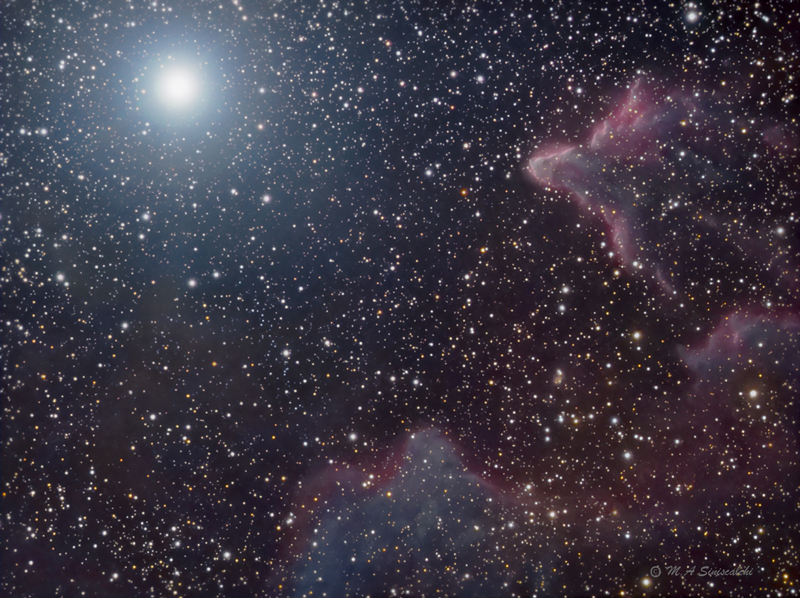
RA: 00h 59m Dec: +60º 55' Mag: 10, Size: 21.6(ly), Distance: 600(ly)

RA: 00h 59m Dec: +60º 55' Mag: 10, Size: 21.6(ly), Distance: 600(ly)
IC63 (right) and IC59 (bottom) are part of the larger interstellar gaseous region Sharpless 2-185 surrounding Gamma Cass. Due to their close proximity of 620 ly the strong stellar winds from Gamma Cass are eroding the nebula structure. IC63 displays filaments as a result of strong ionization fronts with a shape that appears to point at Gamma Cass. and is referred to as a 'cometary cloud'. IC59 being further away has less sharply defined edges. Both objects display blue reflection properties.
Gamma Cassiopeiae is an eruptive variable B0 IVe type star located in the center of the 'W' that forms the Cassiopeia constellation. Visual brightness variations in Gamma Cass are due in part to the stars rapid rotation (>300km/s at the equator) which cause it to emit huge Hα circumstellar gas rings from mass loss. Gamma Cass has an optical double star whose faint mag 11 companion is difficult to see due to the visual brightness of mag 2.5 (varied between 1.6 and 3.0 between 1935 and 1940) and a small separation of 2.3". The diverse behavior and theories surrounding 'B-e' (B star with an emission line) class stars still remain an in depth topic of scientific interest.
| Location & Date |
Backyard, Abbott Observatory |
| Telescope | TMB 130SS APO F/7, Losmandy G11, Image scale 1.68 arcsec/pixel |
| Camera |
SBIG ST-2000XM w/CFW8 Astrodon Tru Balance & Ha Filters CCD temp -15°C |
| Exposure Times | (Ha) 18 x 10m (R) 6 x 10m (G) 6 x 10m (B) 10 x 10m, Bin 1x1 |
| Other Information |
Image acquisition/focus/guiding/dither - CCD Autopilot w/CCDSoft Focus - Moonlite Motorfocus w/FocusMax |
| Image Processing |
* Images Plus 3.5 - Calibration, Normalize, Grading, Alignment, Min Max Average Combine, mild DDP * Adobe PS - Ha blend into RGB, Levels, Curves, Sharpening, Cropping, NR, JPEG conversion |